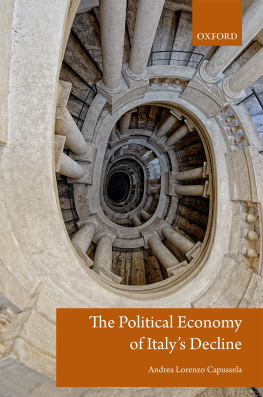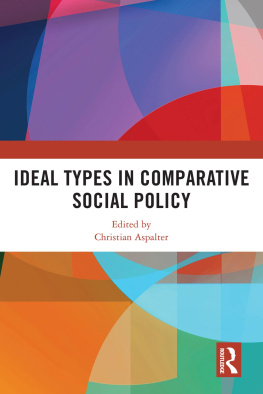Clientelism and Economic Policy
With its deep economic crisis and dramatic political developments Greece has puzzled Europe and the world. What explains its long-standing problems and its incapacity to reform its economy?
Using an analytic narrative and a comparative approach, the book studies the pattern of economic reforms in Greece between 1985 and 2015. It finds that clientelism the allocation of selective benefits by political actors (patrons) to their supporters (clients) created a strong policy bias that prevented the country from implementing deep-cutting reforms. The book shows that the clientelist system differs from the general image of interest-group politics and that the typical view of clientelism, as individual exchange between patrons and clients, has not fully captured the wide range and implications of this phenomenon. From this, the author develops a theory on clientelism and policy making, addressing key questions on the politics of economic reform, government autonomy and party politics.
The book is an essential addition to the literatures on clientelism, public choice theory, and comparative political economy. It will be of key interest to scholars and students of European Union politics, economic policy and party politics.
Aris Trantidis is F.A. Hayek Fellow at George Mason University, the Mercatus Center, USA, and a Visiting Lecturer in the Department of Political Economy, Kings College London, UK.
Routledge Advances in European Politics
For a full list of titles in this series, please visit http://www.routledge.com
118 The Moral Economy of EU Association with Africa
Mark Langan
119 European Space Policy
European integration and the final frontier
Edited by Thomas Hrber and Paul Stephenson
120 Policy Making at the Second Tier of Local Government in Europe
What is happening in Provinces, Counties, Dpartements and Landkreise in the on-going re-scaling of statehood?
Edited by Xavier Bertrana, Bjrn Egner and Hubert Heinelt
121 The Politics of Trauma and Peace-Building
Lessons from Northern Ireland
Cillian McGrattan
122 Eurozone Politics
Perception and reality in Italy, the UK, and Germany
Philip Giurlando
123 Politics of Identity in Post-Conflict States
The Bosnian and Irish experience
Edited by amonn Ciardha and Gabriela Vojvoda
124 Unequal Europe
Social divisions and social cohesion in an old continent
James Wickham
125 Generations, Political Participation and Social Change in Western Europe
Maria T. Grasso
126 Clientelism and Economic Policy
Greece and the crisis
Aris Trantidis
First published 2016
by Routledge
2 Park Square, Milton Park, Abingdon, Oxon OX14 4RN
and by Routledge
711 Third Avenue, New York, NY 10017
Routledge is an imprint of the Taylor & Francis Group, an informa business
2016 Aris Trantidis
The right of Aris Trantidis to be identified as author of this work has been asserted by him in accordance with sections 77 and 78 of the Copyright, Designs and Patents Act 1988.
All rights reserved. No part of this book may be reprinted or reproduced or utilised in any form or by any electronic, mechanical, or other means, now known or hereafter invented, including photocopying and recording, or in any information storage or retrieval system, without permission in writing from the publishers.
Trademark notice: Product or corporate names may be trademarks or registered trademarks, and are used only for identification and explanation without intent to infringe.
British Library Cataloguing in Publication Data
A catalogue record for this book is available from the British Library
Library of Congress Cataloging-in-Publication Data
Names: Trantidis, Aris.
Title: Clientelism and economic policy : Greece and the crisis /
Aris Trantidis.
Description: Abingdon, Oxon ; New York, NY : Routledge, 2016. |
Series: Routledge advances in European politics ; 126 |
Includes bibliographical references and index.
Identifiers: LCCN 2015046996 | ISBN 9781138101401 (hardback) |
ISBN 9781315656953 (ebook)
Subjects: LCSH: Patronage, PoliticalEconomic aspectsGreece. |
Patron and clientEconomic aspectsGreece. | Political planning
Economic aspectsGreece. | Economic developmentPolitical aspects
Greece. | Financial crisesPolitical aspectsGreece. | GreeceEconomic
policy. | GreecePolitics and government.
Classification: LCC JN5147 .T73 2016 | DDC 324.2/495dc23
LC record available at http://lccn.loc.gov/2015046996
ISBN: 978-1-138-10140-1 (hbk)
ISBN: 978-1-315-65695-3 (ebk)
Typeset in Times New Roman
by Apex CoVantage, LLC
If social scientists should explore the phenomena in human societies that matter, either because they improve or because they upset our lives, I have chosen to study how political power interferes in economic activity and affects the decisions of actors regarding the allocation of scarce resources. As a researcher, I have focused on clientelism namely, the distribution of benefits by politicians and political parties to their supporters in return for their votes, campaign contributions and political loyalty. I discovered that clientelist relationships extend beyond the personal exchange of favors between patrons and clients, and have broader implications for the design of economic policy. I soon began working on a research project on clientelism in Greece a little while before the Greek crisis broke up, which affected my parents and my friends, as well as millions of other residents in Greece. The evidence I had collected suggested that clientelist politics had played an important part in shaping the fate of previous efforts to reform Greece. With this book, I wanted to shed new light on what had caused the crisis in a way that advances our understanding of the relationship between politics and the economy.
Years before the crisis, while I was a student in Athens, Professor Panos Kazakos introduced me to public choice theory, a body of work in economics that displaced the assumption that public policy is oriented towards the public interest and, instead, considers politicians and bureaucrats to be driven, like any other economic actor, by their subjective perceptions of utility which often means re-election to office and special economic and financial benefits. Public choice led to a vast literature that has offered an account of politics without romance, in the words of its founding father, James Buchanan. Yet, this body of mostly formal analysis, like any other in social sciences, is not without fault. Many analyses of public policy tend to overlook that political and social actors interact with one another in nuanced institutional settings under recurrent relationships and specific norms of behavior. These settings shape regular preferences, generate interdependences among the actors involved and limit strategic behavior to a narrower set of options. These settings can only be explored in depth by empirical analysis that is qualitative and historical. Once we observe that the practice of clientelism generates a unique institutional setting, it should not be long before we ask the question: does clientelism have a distinctive impact on policy reform compared to typical interest-group activity and party politics?
The purpose of this book is to put forward a theory on the impact of clientelism on economic reform and explain the Greek case. Greece offers an excellent opportunity to test and refine a number of hypotheses and contribute to the general literature on economic reforms. Using an analytic narrative and a comparative approach, the book casts light on the distinct properties of the clientelist system and explains why resistance to reform is likely to be stronger here compared to other settings. It shows that the clientelist system has properties that substantively differ from established premises about electoral competition and interest-group activity. Clientelism creates a relationship of interdependency between parties and clients that relies on the ongoing supply of clientelist benefits. This explains why client groups are the most important social groups for the political parties, and why clientelism has a unique impact on the bargaining power and relative autonomy of clients and patrons. Unlike the typical context of interest-group competition, the governments autonomy to shift social alliances or forge new ones over proposed policies is expected to be considerably limited in a clientelist system, given that placing limits on the supply of patronage will primarily affect relations inside the party and, ultimately, its cohesion and mobilization capacity.













